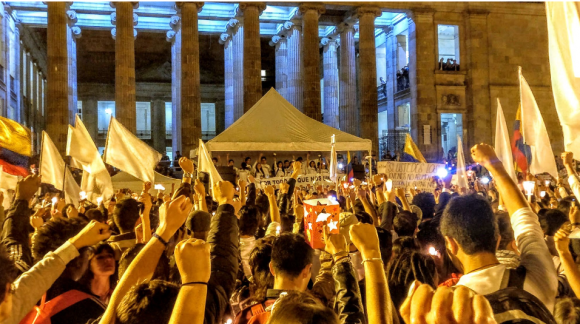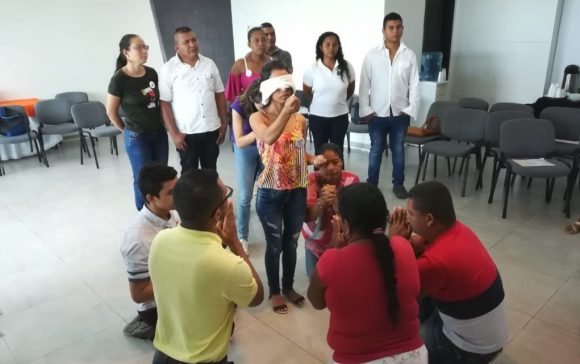La démocratie ne se construit pas en un jour : Le cas de la Colombie

Chaque fois qu'un pays fait ses premiers pas vers un gouvernement plus démocratique, nous sommes facilement enclins à conclure qu'il est devenu une démocratie.
Mais la véritable démocratie ne se résume pas à des élections.
Il s'agit de diversité, de responsabilité et d'inclusion... Il s'agit de politiciens et d'institutions politiques qui répondent aux besoins de la population, et il s'agit d'une population qui demande à ses politiciens de rendre des comptes. Et ces changements demandent beaucoup plus de temps.
Dans cette série d'articles, rédigés par le journaliste Joris Tielens pour le NIMD-Vice Versa Spécial Démocratie, nous explorons les conséquences des premiers pas vers la démocratie dans deux pays très différents : Tunisie et la Colombie.
Partie 2 : Colombie
Au cours des dernières années, la Colombie a suscité d'immenses attentes en faveur d'une démocratie plus ouverte et plus inclusive. Toutefois, la motivation sous-jacente du renforcement de la démocratie n'est pas d'améliorer l'économie et le bien-être, comme c'est le cas en Tunisie, mais de favoriser la paix.
Après l'accord de paix
Après des décennies de guerre et d'attaques, le gouvernement colombien a finalement signé l'accord de paix avec les FARC en 2016. Les rebelles ont rendu leurs armes et les FARC sont devenues un parti politique légal qui a obtenu des sièges au Parlement du pays. Un tribunal a été créé pour juger les auteurs des violences.

Mais d'autres parties de l'accord de paix n'ont pas été mises en œuvre, affirme Ángela Rodríguez Sarmiento, qui dirige le bureau de la NIMD à Bogota : "Le président nouvellement élu n'a pas la volonté politique de mettre en œuvre l'accord de paix de manière efficace".
Les victimes de la violence devaient recevoir des sièges parlementaires spéciaux ainsi que des réparations, tandis que les régions que les FARC contrôlaient auparavant - les zones frontalières colombiennes - devaient recevoir une aide pour redévelopper la sécurité, les soins de santé et l'éducation.
Cela n'a pas été le cas, explique M. Rodríguez, et un vide de pouvoir s'est donc créé dans ces régions, qui ne sont plus contrôlées par les FARC ni par les autorités nationales. Cela a donné libre cours aux activités illégales, au trafic de drogue et à la culture de la coca.

La montée de la violence
Ces derniers temps, la violence a repris de plus belle en Colombie. L'incapacité des autorités à contrôler ces régions a été l'une des causes sous-jacentes du conflit avec les FARC, explique M. Rodríguez, et est à nouveau à l'origine de la montée de la violence.
Ceux qui tirent profit des activités illégales profitent de l'instabilité politique. S'ils faisaient légalement partie du système politique, ils ne pourraient pas mener leurs activités illégales.
Il est donc d'autant plus important que les victimes de cette violence, dont beaucoup sont des femmes, des jeunes, des autochtones et des Afro-Colombiens, bénéficient d'une meilleure représentation politique, selon M. Rodríguez. La participation politique est la clé. Les FARC sont devenues un mouvement de guérilla armée parce qu'elles étaient exclues du processus politique. Pendant de nombreuses années, le système n'a été accessible qu'à une poignée de personnes, principalement des hommes blancs.
Le NIMD en Colombie
Mais ce processus n'est pas automatique. Après la conclusion de l'accord de paix, la NIMD a été chargée de jouer un rôle dans la démocratisation et le renforcement de la participation politique. Elle gère actuellement des programmes dans huit des seize départements que le gouvernement et les FARC ont déclarés les plus touchés par le conflit.

La présence du NIMD est passée de deux à dix-sept personnes, et les écoles de la démocratie ont formé des politiciens, des membres de la société civile et des citoyens aux compétences politiques et à la conduite d'un dialogue pacifique.
La démocratie ne se limite pas à l'organisation d'élections", déclare M. Rodríguez. Il s'agit aussi de savoir comment les personnes élues doivent rendre des comptes". Mais avant de pouvoir se concentrer sur la formation, elle est bien consciente que la sécurité doit être garantie.
Cela doit passer en premier. Nous travaillons avec le personnel gouvernemental responsable de la sécurité ainsi qu'avec les partis politiques pour protéger les personnes qui s'expriment politiquement. Les partis politiques ignorent souvent qui sont leurs propres candidats et ces personnes ne sont pas protégées".
Regarder vers l'avenir
Que pense Rodríguez de l'avenir ?
La population perd confiance dans l'accord de paix. Après 60 ans, la guerre et la violence étaient devenues la norme pour les Colombiens. Les meurtres et les enlèvements étaient considérés comme faisant partie intégrante du processus politique.
Lorsque les armes se sont tues et que les attaques dans les villes ont cessé, la plupart des gens ont pensé que le problème avait été résolu. Mais de nombreuses questions sous-tendent toujours le conflit : la corruption, la production et le commerce illégaux de stupéfiants, l'absence d'institutions publiques fonctionnant correctement dans les départements et le manque de représentation de larges groupes de la société.
Les gens de la rue, ceux qui votent pour leurs candidats lors des élections, doivent encore apprendre à surveiller les personnes au pouvoir. Ils doivent également apprendre à exiger de ceux qu'ils élisent qu'ils fassent preuve de transparence et qu'ils rendent des comptes.
Nous devons les réveiller. Les élections ont eu lieu, mais nous devons encore créer une démocratie qui surmonte les anciennes façons de faire de la politique, traditionnellement corrompues.
Le lundi 10 février, le NIMD s'associe à Vice versa pour accueillir "Talkshow : Une démocratie inclusive" à La Haye. Le talk-show réunira des experts de premier plan du mouvement de démocratisation, avec des politiciens actuels et anciens et des experts de la société civile.
